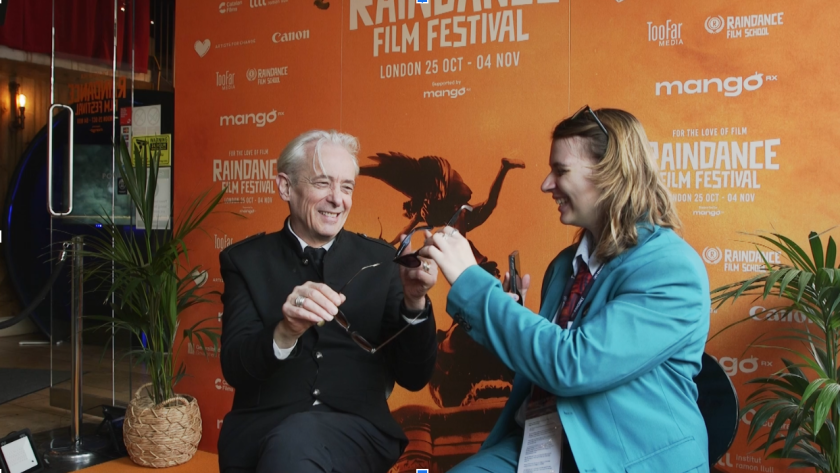In a sunlit corner of Wonderville Raindance headquarters, clad in signature sunglasses sat Elliot Grove, the visionary founder of Raindance Film Festival. Alexia Mihaila from the Filmsoc Journal had a chat with him about his journey through independent cinema, personal branding, and the evolving landscape of filmmaking.
We started by making some introductions telling him about Filmsoc. To which Elliot replied in awe about how his daughter went to UCL years ago and loved it.
ELLIOT: You’ve always had such a good Filmsoc there, and of course, Chris Nolan and other people who have touched UCL.
In the spirit of Elliot’s brand, I took out of the pocket of my blazer my prescription sunglasses. He encourages me took put them on and starts telling us about how he went blind years ago, hence why he wears them all the time. I assure him that mine is also for my vision and I respect how he built his whole persona around himself.
ELLIOT: It’s true. I even sleep with them on that’s how embedded it is in my personal branding. Here, You wear mine and I’ll wear yours.
Elliot proposed a playful switch of eyewear and as we swapped, he started waving his arms around, attempting to decipher the world through my glasses. After a brief moment, we traded them back.

ALEXIA: Well, now we’re both back in focus.
The Raindance Legacy
ALEXIA: Elliot, could you tell us a bit more about your history with Raindance and BIFAs (British Independent Film Awards) and how you came to establish them?
ELLIOT: I was going through a rough period of life and I started bringing people over from America to teach, back in 1992. A couple of people helped me that first year, a guy called Edgar Wright being one of them. We were sitting around at the table one day wondering why all the cool new indie films didn’t go to the big British film festivals. So we decided to start our own film festival.
In 1993, we started the first year and it was so hard to get British people to come because they just didn’t realize there were any British films. Five years later, we started the British independent film awards (BIFAs) to put a spotlight on these films. I started small, it’s gotten huge now to the point where having just seen the awards nominations a couple days ago and the quality of British films has just exploded over the last thirty years, but it’s been a long journey.
Crafting the Raindance Fabric
ALEXIA: Do you remember what were some of the beginning setbacks that you encountered or what were some of the milestones from your journey of building this empire of independent film?
ELLIOT: When I started Raindance, we had no idea how to do this. I got that year’s Cannes product guide where they published this directory of all the films. I got Susanna, my partner and programmer, to circle a hundred films and I had fax numbers. We were so broke then, only had one hundred pounds. I was sharing an office that charged a pound, a page to fax internationally. We sent a hundred faxes out and 67 films came including ‘What’s Eating Gilbert Grape’. Now it was completely mad to think that that would happen, but that’s how we started basically from absolutely nothing.
Then, over the years it’s gone up and down every year up a little bit. ‘Blair Witch Project’, twenty one years ago. So many filmmakers come from other countries and due to the hospitality of this great national city of yours, I’m Canadian by the way, they like to come for a holiday in London and see their film in a cinema with, hopefully, people who love their work. It’’s just sort of grown to the point where this past year we had so many submissions that for every film we show we said no to 95. We just didn’t have room, which is quite extraordinary.
ALEXIA: What’s your go-to process of deciding which films make it into the festival? How long does it take?
ELLIOT: We’ve already started for next year, a couple months ago. One person watches it, let’s say it’s you, and if you like it, then another person watches it, and if they don’t like it, then a third person watches. Three people watch every single film, we get a long list, and then we have to whittle it down. We have a British Premier status, so if you’ve already played an Edinburgh or LFF, you’re not qualified for Raindance.
“We like to have the freshest of the fresh, the boldest of the bold and the newest of the new. “
The Current Landscape and Future of Independent Cinema
ALEXIA: Since you’ve seen the industry grow so much from the beginning until now, what would you say the future of independent cinema is like, or what is the current landscape?
ELLIOT: The current landscape is very difficult because distribution is a big problem. I started Raindance back in 92, when we only had 35mm. In 1999, people started making films on electronic cameras, like that one.
Elliot starts pointing at my camera.
ELLIOT: Then in the mid-early noughties, we had Netflix, going from home service by renting DVD or VHS to now Netflix and the streamers; then of course, in the last 18 months, something called artificial intelligence. So the future of independent filmmaking is as precarious as ever, it’s also as challenging as ever, and I must say to you, as rewarding as never before. Independent filmmakers make the films about social injustice, they are the whistleblowers that make the films that Hollywood would normally overlook.
The reason we need this so much right now is a bit like 3000 years ago, we had the ancient prophets predicting wars, pandemics, Noah and the flood, climate change. They told parables, stories, to help their locals understand and process what was happening, and some of these parables were so profound, we still refer them to them today. Independent filmmakers are the new champions, the new storytellers, the new prophets, helping us explain how society is changing, what the pitfalls are, what the perils are, and what the optimism is. We need strong independent voices, divorced from the big corporations and government for that matter, to give us the honest truth so that you and I can process how we take the next step. That’s why we do Raindance, and that sounds that very grand. But anyway, that’s why I’m here today with you.
ALEXIA: Thank you, and obviously all of the workshops that you’ve done so far within the festival have all been about promoting your film and about artificial intelligence and even about climate change. So that’s very helpful for independent filmmakers that come here.
What advice would you have for the ones that want to make their voices heard in this landscape of content oversaturated.
ELLIOT: You need to start with your distribution strategy before you make your film, even before you write it. Build up your social media, create your network of people to not only help you make your film, but help get the word out. Then of course, the real secret to success, the one that everyone seems to overlook is you need to make an excellent and entertaining film, regardless of the topic or the subject. Do that, and they’ll send the the Rolls Royce.
ALEXIA: In terms of the branding, I love the way you talk, and the way you present yourself is incredible. We were talking even about the blazer that you have, that you bought in New York, and you wear it all the time. How did you build up this brand? Did that come easy for you?
ELLIOT: Filmmakers have two branding issues to conquer. One is the branding of their film, and the easiest way to brand your film is to use the tool of genre. Are you doing horror, love, action, thriller, sci-fi, documentary? Are you doing a real-life doc? That’s your film branding.
People don’t go to see movies, they go to see a horror film, a sci-fi, a green doc, or whatever.
So that’s really important. And of course you as a person, as a filmmaker, or anyone watching, your personal branding is really important, and no you don’t need to go to discount shops in New York and find something cool for twenty nine bucks. Or wear sunglasses day and night, which I do by the way, because I went blind seven years ago, and I had my cataracts removed in these lights, give me a headache.
Elliot says while pointing at the Raindance orange carpet lights setup.
ELLIOT: Personal branding is about what people think of you. Are you honest? Are you hardworking? Are you creative? Are you punctual? These are the sorts of things you develop on your personal brand. Then of course if you want to get your nose pierced or wear, I don’t know, hula hoops or on your neck or whatever, that’s up to you. You’ll figure that out, but do whatever you want to do to feel comfortable in the way you look when you walk in a room. Preparedness is like a number one on my list. But number two is, are you fun to be with? You don’t need to be gregarious. I do a lot of public speaking. I’m actually incredibly shy. But do people value what you say when you say something? Is it meaningful or meaningless? You develop that as you age, you’ll figure it out.
The face of the Devil: ‘Lassie Comes Home’ (1943)
ALEXIA: Do you have some film that have shaped your opinion on filmmaking or that you’d recommend anyone should see?
ELLIOT: I have only one film to recommend, the very first film I saw. I grew up Amish outside of Toronto. My parents always told me never ever to go to the movie theater because the devil lived there and here I am doing the devil’s work. I’m sixteen, it’s harvest season and I get sent to the local village outside Toronto to the blacksmith. When I found out I had to wait three hours, you see, it wasn’t worth me going all the way home coming back. I had a few coins in my pocket and I was wondering what the devil looked like. Tthere it was, three doors down from the house of the Lord, the house of the devil, the movie theater. Back then they only charged 99 cents to see the face of the devil.
Now remember, I had absolutely no idea what a movie was. I just don’t go in there, walked down this corridor into a big room, you know, a bit like church. Chairs lined up, facing the front. I sit down. It’s about two o’clock in the afternoon.I put a fabric on the chairs next to me as red. I thought “Ah, the color of the devil.” They turned the flip and lights off, the curtains slowly opened and the first face of the devil I saw was Lassie Comes Home (1943). I cried like a baby. At the end I rushed up to touch the screen, it was all gone and it twinked in my eye. That’s my favorite movie and that’s why I am here today.
ALEXIA: That’s incredible. I am adding that to my watchlist!
ELLIOT: You’ll cry. You’ll cry.
Nurturing Aspiring Filmmakers
ALEXIA: Lastly, what advice would you have for independent filmmakers now that want to break into the industry? For example, you have this person that is interested in film, but maybe has no connection, no money. What would you recommend them to do?
ELLIOT: If you want to be a filmmaker, you need to make films. You make films on this very device here right now. Just stop worrying about whether or not it’s going to be any good. Make your mistakes fail, but fail fast. Do it again and again, develop your home, your craft. Remember, you are in these days not a filmmaker, but a multi-format content creator: creating documentaries, taking short web series. I have a friend who is making so much money doing gifs, little three second gifts for brands. It’s all storytelling, you see. It’s all about telling your story and every day honing your craft.




